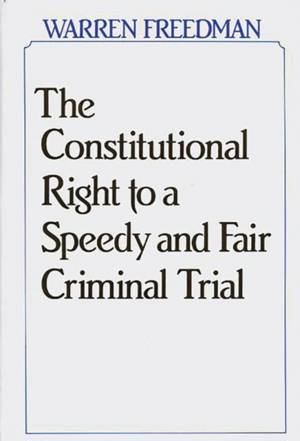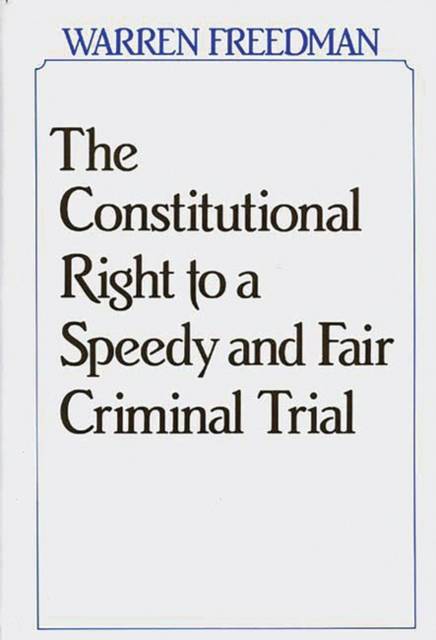
- Afhalen na 1 uur in een winkel met voorraad
- Gratis thuislevering in België vanaf € 30
- Ruim aanbod met 7 miljoen producten
- Afhalen na 1 uur in een winkel met voorraad
- Gratis thuislevering in België vanaf € 30
- Ruim aanbod met 7 miljoen producten
Omschrijving
Although the U.S. Constitution guarantees those accused of a crime the right to a speedy and fair trial, in practice the judicial system is increasingly characterized by excessive trial delays and unfair trial situations. Here Warren Freedman, a member of the New York, Connecticut, and U.S. Supreme Court bars, offers a comprehensive discussion of the constitutional and statutory provisions underlying the right to a speedy and fair trial and examines their application in actual court practice. As Freedman notes, the mounting costs of lengthy litigation periods dictate that--if only for pragmatic reasons--the constitutional rights of accused criminals to speedy and fair trials must be respected.
Freedman begins with an introduction to the concept and historical background of the speedy and fair trial. Turning to an examination of constitutional guarantees, he fully reviews the sixth and fourteenth amendments and their interpretation by the courts. Subsequent chapters examine the criteria for speed and fairness, the role of the jury, and related statutes such as The Speedy Trial Act of 1974, as well as grand jury investigations and prosecutorial abuses of the legal principles that guarantee speed and fairness. Throughout, analyses of applicable case law and precedent-setting court decisions illuminate the discussion. An indispensable resource for attorneys in criminal, corporate, and private practice, this volume clearly delineates not only the foundations of speedy and fair trial guarantees but also the many factors that can work against them in today's often overburdened judicial system.Specificaties
Betrokkenen
- Auteur(s):
- Uitgeverij:
Inhoud
- Aantal bladzijden:
- 189
- Taal:
- Engels
- Reeks:
Eigenschappen
- Productcode (EAN):
- 9780899303314
- Verschijningsdatum:
- 20/01/1989
- Uitvoering:
- Hardcover
- Formaat:
- Genaaid
- Afmetingen:
- 148 mm x 216 mm
- Gewicht:
- 408 g

Alleen bij Standaard Boekhandel
Beoordelingen
We publiceren alleen reviews die voldoen aan de voorwaarden voor reviews. Bekijk onze voorwaarden voor reviews.











